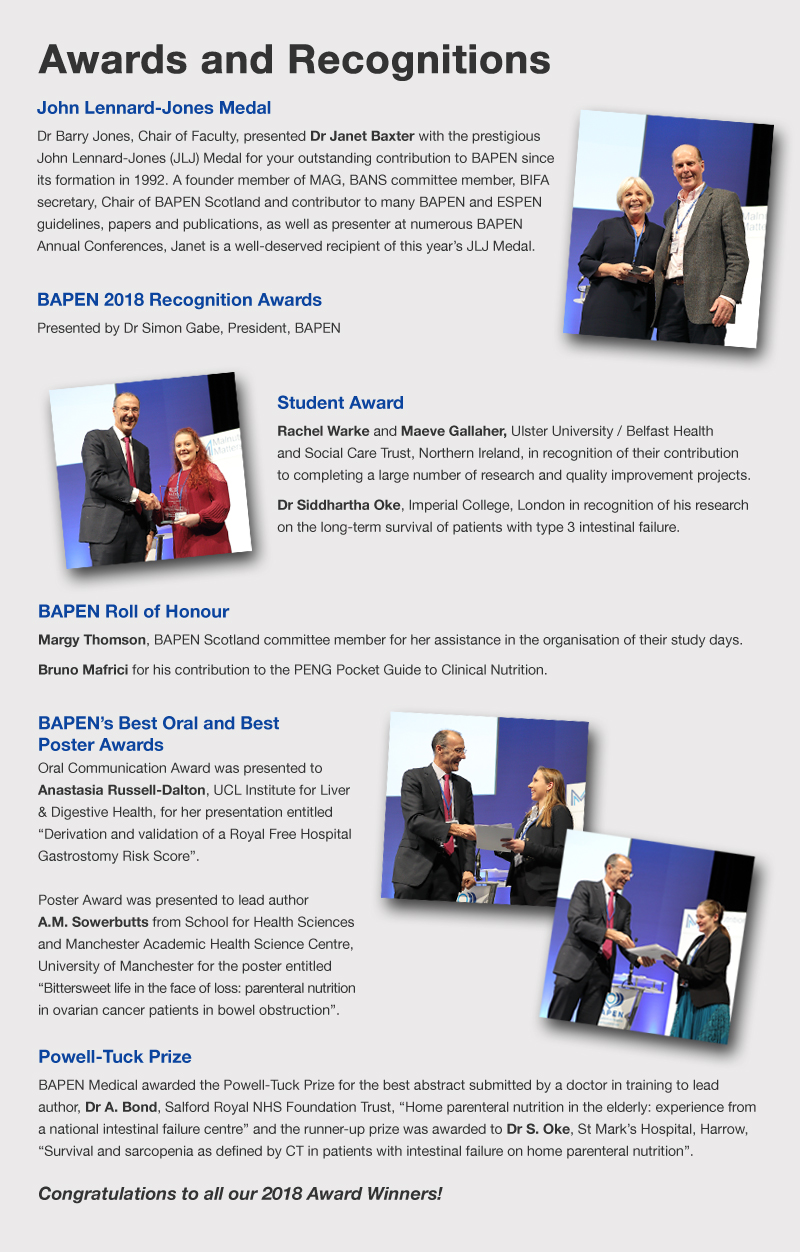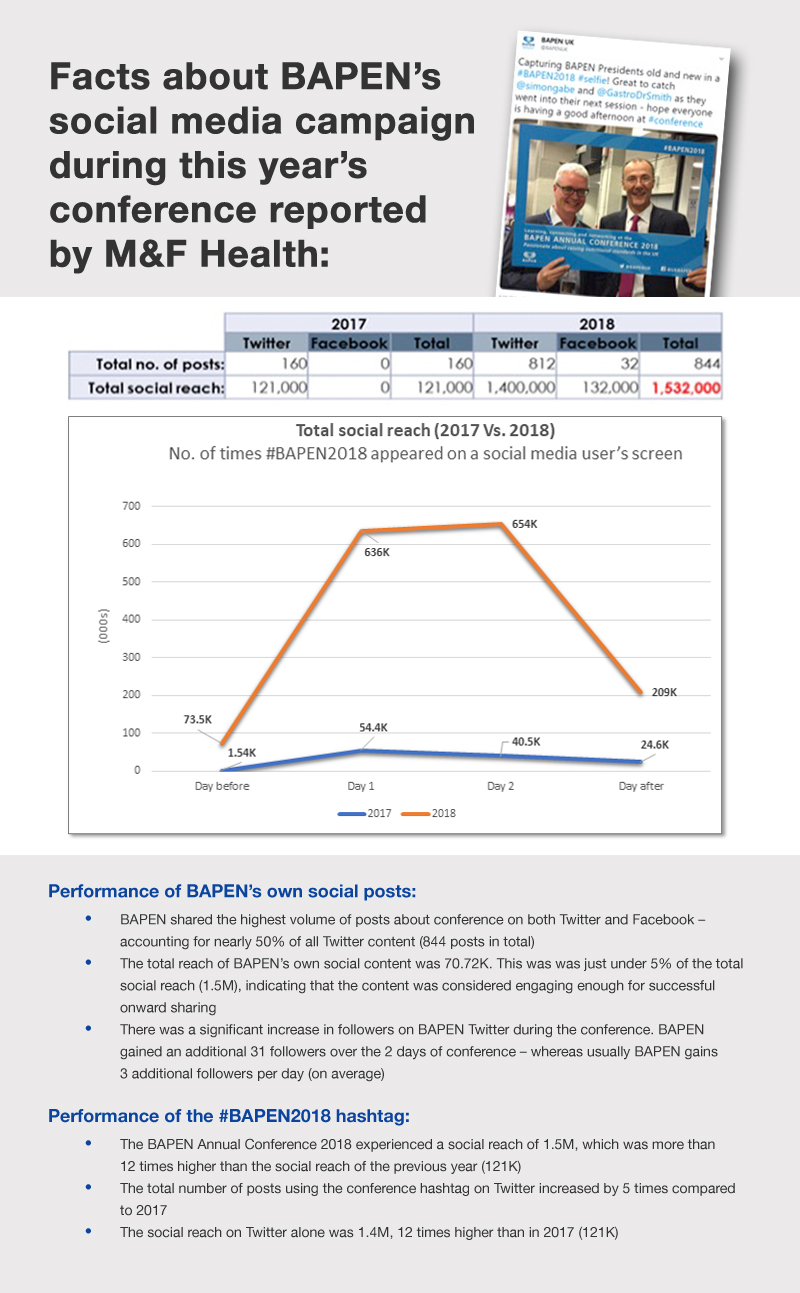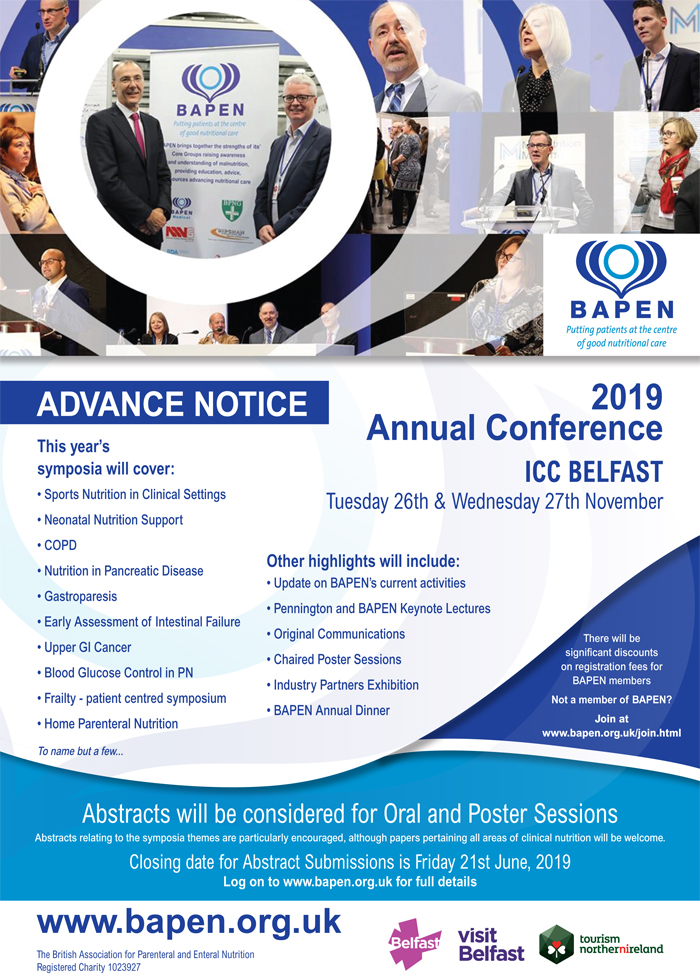
BAPEN Malnutrition Matters Conference 2018

The BAPEN Programmes Committee report on the 2018 BAPEN Annual Conference: Pete Turner (Chair) & Jennie Mort (Sovereign Conference); and Symposia Chairs Tony Murphy, Dr Jeremy Nightingale, Dr Jutta Köglmeier, Wadi Gashua & Dr Andrew Rochford.
The 2018 BAPEN Annual Conference – Malnutrition Matters – attracting over 460 attendees, offered delegates an extensive range of clinical and scientific topics relevant to both acute and community settings providing over 13 symposia, the Pennington and Keynote Lectures, the Nutricia breakfast symposium, 2 satellite symposia sponsored by Abbott and Shire, chaired poster sessions incorporating top scoring abstracts, and the annual dinner. The conference enabled delegates to hear of cutting-edge and innovative practice with an abundance of practical take home messages to facilitate improvements in the delivery of nutritional care back in the workplace.
Whilst it is not possible to describe all of the sessions in detail this review provides insight into some of the conference highlights.
The BPNG organised symposium Information Technology for Nutrition Support, chaired by Tony Murphy, University College London Hospitals, considered how information technology is being used to electronically prescribe parenteral nutrition (PN), link patients to the hospital nutrition team, and remotely monitor home parenteral nutrition (HPN). Dr Mohammed Al-Ubaydii gave a presentation on the ‘Patients Know Best®’ programme, an online IT solution for linking patients to clinical teams in hospitals and the community. This programme has been developed by Mohammed and is used widely in the UK. His talk attracted several questions on the cost of implementation. Mia Small, Consultant Nurse in Nutrition and Intestinal Failure at St Mark’s Hospital, Harrow, spoke about St Mark’s experience of remote monitoring of HPN. Accurate information on infusion rates, volume infused, could be monitored and there were several instances where the records explained complications, such as dehydration, and missed doses of PN and fluids. Carola McKenna, Pharmacist at UCLH, spoke about the implementation of the EPIC healthcare system at University College London Hospitals. This system is used in the United States, and adaptation of the system to suit the UK market has been challenging. Although, the part of the programme that allows e-prescribing of parenteral nutrition, and includes pharmacy worksheets and compounding, is now well developed and will go live at UCLH in April 2019. Emma Murray, a clinician at the Belfast City Hospital gave an interesting oral communication on a project to improve biochemical monitoring in inpatients on parenteral nutrition. The project, which involved the use of a quality improvement model, has been a success, improving compliance from 50% to 90%. The scheme is to be expanded to other wards. Her presentation was well received.
BIFA held two symposia at BAPEN 2018 jointly with the NNNG, the first related to Palliative Care and PN and was chaired by Dr Jeremy Nightingale, St Mark’s Hospital, Harrow and Liz Anderson, Bucks Healthcare NHS Trust. Dr Mani Naghibi, Consultant in Gastroenterology and Human Nutrition, St Mark’s and Northwick Park Hospitals, opened the symposium with a presentation entitled ‘When to start and when to stop PN’. This was followed by a presentation from Dr Jeremy Woodward, Consultant Gastroenterologist, Addenbrooke’s Hospital, Cambridge, who covered the treatment goals of PN in the palliative setting. An interactive case study about the patient with ovarian cancer and a high output ileostomy with, ultimately, small bowel obstruction was presented by Alison Young to the panel: Dr Naghibi, Dr Woodward, Alison and Anne-Marie Raftery, Lead Nurse Palliative Care from The Christie NHS Foundation Trust. Discussions were about giving/not giving parenteral support, use of a venting gastrostomy and what information/advice to give to the patient and her husband. The symposium concluded with an original paper presented by Dr Ashley Bond from Salford Royal Foundation Trust, about ‘A novel discharge pathway for patients requiring palliative home parenteral nutrition’.
The second BIFA symposium was about Venous Access and was chaired by Dr Jeremy Nightingale and Natalie Welsh, Manchester University NHS Foundation Trust. The symposium opened with an original paper entitled ‘Survival and fungal catheter related blood stream infections in patients on home parenteral nutrition’ by Dr Siddhartha Oke, St Mark’s Hospital, Harrow. Winifred Magambo-Gasana, Advance Nurse Practitioner from Oxford University Hospital NHS Trust, then spoke about the choice of vascular access device. This was followed by Dr Geert Wanten, Associate Professor of Intestinal Failure, Radboud University Medical Centre, The Netherlands, who spoke on ‘Arteriovenous fistulae as a route for venous access in HPN’. Their first patient was sent home on PN in 1969, he uses AV fistulae for selected patients especially if recurrent infections, though they may have problems of stenosis/occlusion over time even though anti-coagulated. Joe Colby, Lead Nurse for Nutrition Support from University Hospitals Coventry and Warwickshire NHS Trust, talked about ‘Counselling for patients with intestinal failure’. The symposium concluded with an impassioned talk from Carolyn Wheatley, Chair of PINNT and HPN patient, about the patient's perspective on line type, position and care; it was backed up by her own survey of patient opinions.
The symposium organised by BSPGHAN focused on Sugar, with the aim to consider the potential health benefits of reducing sugar intake in adults and children, review the definitions of sugars and the labelling of food products. The evidence for the effectiveness of different initiatives to reduce population sugar intake, including whether sugar taxes work, were reviewed. The session was chaired by Jutta Köglmeier, Consultant Paediatric Gastroenterologist at Great Ormond Street Hospital and Chair of the BSPGHAN Nutrition Working Group and Sapthagiri Gantasala, Consultant Paediatrician with a special interest in Gastroenterology at Pilgrim Hospital in Boston. Dr Susan Hill, Consultant Paediatric Gastroenterologist at Great Ormond Street Hospital in London started with a brief presentation of data from the recent phase 3 study on Teduglutide, a glucagon-like peptide 2, in children with short bowel syndrome associated intestinal failure. In a 12-week open label study two doses of Teduglutide (0.025 mg/kg and 0.05 mg/kg) were compared to a control group. The use of Teduglutide in this age group appears safe and the results are promising, as clinically meaningful reductions of parenteral support were attained. The responder rate for parenteral support reduction and enteral autonomy was largest in the group treated with the higher dose of 0.05 mg/kg of Teduglutide. Professor Angus Walls, Director of the Dental Institute at the University of Edinburgh, gave a fascinating lecture on the impact of sugars in children and adults and the detrimental effect sugar containing foods and drinks can have on oral health. Sally Moore, Freelance Public Health Dietitian and PhD Researcher at the University in Leeds, spoke about the definitions and the confusing labelling issues of dietary sugar. The symposium concluded with Bernadette Moore, Associate Professor of Obesity at the University in Leeds, giving a talk on sugar taxes as a way to reduce sugar.
Liver disease continues to rise in incidence within the UK resulting in increased morbidity and mortality. The BAPEN medical trainee symposium, Nutrition and Liver, chaired by Dr Chris Mountford, Consultant Gastroenterologist, and Dr Wadi Gashau, ST7 Gastroenterology, focused on the interplay between nutrition and the liver. Led by Consultant Hepatologist, Dr Matthew Armstrong, Specialist Dietitian Jennifer Towey and Dr Amrit Dhaliwal, ST6 gastroenterology, demonstrated through a case presentation the nutrition challenge faced in the support of those with compensated then decompensated liver disease particularly in the context of critical care and transplant work up. One of the key messages resonating with the audience experience was the need to ensure adequate evening time calorific intake to avoid prolonged fasts when compensated along with the need to achieve optimal protein requirements in decompensated disease while avoiding over feeding in those who are critically ill. Another key learning point related to means of assessing for sarcopenia in day-to-day clinic life and measures that could be introduced to slow the loss of muscle mass, particularly in the pre- and post-transplantation cohort which leads to better quality of life, reduced complications and mortality in this group.
Dr Darren Wong, Senior Clinical Fellow in Gastroenterology at John Radcliffe Hospital, Oxford, then eloquently discussed commonly encountered challenges among patients on parenteral nutrition with deranged liver function tests driving home the point that sepsis must be excluded first within this cohort, and the need to ensure iatrogenic hepatoxicity is avoided via the PN route. Finally, Prof Joseph Boullata, Clinical Professor in Nutrition Sciences from Drexel University, Philadelphia, provided us with first hand views of the US perspective on parenteral nutrition highlighting similarities and differences in practice there. He went on the echo the messages from all three discussions promoting ongoing diligence in the careful monitoring and review of all patients requiring nutritional support of any kind.
 This year’s prestigious Pennington Lecture ‘You Can Do It!’ was delivered by Dr Jeremy Nightingale, Honorary Consultant Gastroenterologist, St Mark’s Hospital. Dr Nightingale paid tribute to Chris Pennington’s research and clinical work before sharing details on his early career in nutritional support under the guidance of Professor John Lennard-Jones. He described how he set-up and established a Nutrition Support Team at Leicester Royal Infirmary and his keen interest in intestinal failure and fluid management. Dr Nightingale received the Sir David Cuthbertson Medal by The Nutrition Society in 1993 for his work on the problems of short bowel. He has had many papers publishing which included the best-selling textbook entitled ‘Intestinal Failure’.
This year’s prestigious Pennington Lecture ‘You Can Do It!’ was delivered by Dr Jeremy Nightingale, Honorary Consultant Gastroenterologist, St Mark’s Hospital. Dr Nightingale paid tribute to Chris Pennington’s research and clinical work before sharing details on his early career in nutritional support under the guidance of Professor John Lennard-Jones. He described how he set-up and established a Nutrition Support Team at Leicester Royal Infirmary and his keen interest in intestinal failure and fluid management. Dr Nightingale received the Sir David Cuthbertson Medal by The Nutrition Society in 1993 for his work on the problems of short bowel. He has had many papers publishing which included the best-selling textbook entitled ‘Intestinal Failure’.
 This year’s Keynote Lecture ‘Drug-Nutrition Interaction in Nutrition Support’ was delivered by Prof Joseph Boullata, Clinical Professor in Nutrition Sciences from Drexel University, Philadelphia. A recognised expert in nutrition support and nutritional pharmacotherapy, Boullata has performed research and published in areas of nutrition gastroenterology, and critical care, authoring over 70 chapters and papers in peer-reviewed journals.
This year’s Keynote Lecture ‘Drug-Nutrition Interaction in Nutrition Support’ was delivered by Prof Joseph Boullata, Clinical Professor in Nutrition Sciences from Drexel University, Philadelphia. A recognised expert in nutrition support and nutritional pharmacotherapy, Boullata has performed research and published in areas of nutrition gastroenterology, and critical care, authoring over 70 chapters and papers in peer-reviewed journals.
A select few were fortunate enough to attend a Publication Workshop led by Professor Mark Beattie the new Editor-in-Chief of Frontline Gastroenterology. We were given a fantastic insight into the world of clinical publishing with excellent tips, tricks and suggestions to increase the chances of a successful publication. Articles on clinical nutrition remain under-represented in comparison to other GI specialities; however, there is a commitment to change this with journals such as Frontline Gastroenterology. Preparation is the key for success if you wish to publish. You should start by considering what would make your project interesting to the reader and to the publisher (think altmetrics!); be rigorous in your study design and specific in your intended outcomes. Hopefully, we will see a rise in publications from BAPEN members in 2019.
The exhibition, showcased over 30 healthcare companies and not for profit organisations with an interest in nutrition, along with BAPEN and its Core Groups: BPNG, BSPGHAN, NNNG, PENG and PINNT. This year’s Poster Exhibition displayed over 70 posters, all of which were presented as oral communications over the two days. The BAPEN ‘Moulin Rouge’ themed Annual Dinner was held at the Majestic Hotel, Harrogate.
The BAPEN Annual Conference is a multi-disciplinary event organised by representation from each of the following organisations:




